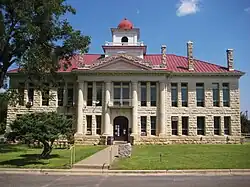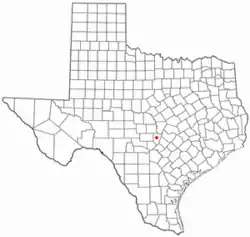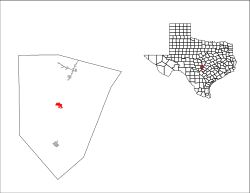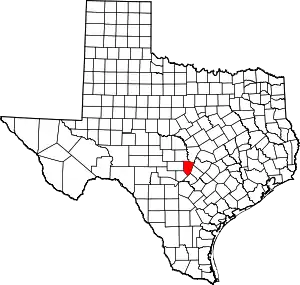Johnson City, Texas | |
|---|---|
 Blanco County Courthouse | |
| Motto: "The Crossroads Of The Texas Hill Country"[1] | |
 Location of Johnson City, Texas | |
 | |
| Coordinates: 30°16′35″N 98°24′29″W / 30.27639°N 98.40806°W | |
| Country | United States |
| State | Texas |
| County | Blanco |
| Founded by | James P. Johnson |
| Named for | Sam E. Johnson, Sr. |
| Government | |
| • Chief Administrative Officer | Rick Schroder |
| Area | |
| • Total | 1.81 sq mi (4.69 km2) |
| • Land | 1.81 sq mi (4.68 km2) |
| • Water | 0.00 sq mi (0.01 km2) |
| Elevation | 1,198 ft (365 m) |
| Population (2010) | |
| • Total | 1,656 |
| • Estimate (2019)[3] | 2,131 |
| • Density | 1,179.96/sq mi (455.50/km2) |
| Time zone | UTC-6 (Central (CST)) |
| • Summer (DST) | UTC-5 (CDT) |
| ZIP code | 78636 |
| Area code | 830 |
| FIPS code | 48-37780[4] |
| GNIS feature ID | 1338790[5] |
| Website | www |




Johnson City is a city and the county seat of Blanco County, Texas, United States.[6] The population was 1,656 at the 2010 census.[7][8] Founded in 1879 by James P. Johnson, it was named for early settler Sam E. Johnson, Sr.[9] Johnson City is part of the Texas-German belt region.
History
Johnson City was founded by James P. Johnson who donated a 320-acre (130 ha) site on the Pedernales River for the founding of the town in 1879.[8][10][11] It was the hometown of Lyndon B. Johnson, 36th U.S. president. The county seat of Blanco County was moved to Johnson City in 1890.[11]
Geography
Johnson City is located in central Blanco County at 30°16′35″N 98°24′29″W / 30.276427°N 98.408105°W,[12] about 1 mile (2 km) south of the Pedernales River. U.S. Routes 281 and 290 join near the center of town; US 281 leads north 23 miles (37 km) to Marble Falls, and US 290 leads west 30 miles (48 km) to Fredericksburg. The two highways run south out of town together; US 290 soon turns east and leads 47 miles (76 km) to Austin, while US 281 continues south 64 miles (103 km) to San Antonio.
According to the United States Census Bureau, Johnson City has a total area of 1.7 square miles (4.5 km2), all land.[7]
Climate
Johnson City experiences a humid subtropical climate, with hot summers and a generally comfortable winter. Temperatures range from 82 °F or 27.8 °C in the summer to 47 °F or 8.3 °C during winter.
| Climate data for Johnson City, Texas (2 miles north) (1991–2020 normals, extremes 1964–present) | |||||||||||||
|---|---|---|---|---|---|---|---|---|---|---|---|---|---|
| Month | Jan | Feb | Mar | Apr | May | Jun | Jul | Aug | Sep | Oct | Nov | Dec | Year |
| Record high °F (°C) | 89 (32) |
100 (38) |
102 (39) |
101 (38) |
104 (40) |
110 (43) |
110 (43) |
110 (43) |
110 (43) |
98 (37) |
93 (34) |
89 (32) |
110 (43) |
| Mean daily maximum °F (°C) | 62.3 (16.8) |
65.8 (18.8) |
72.9 (22.7) |
79.9 (26.6) |
86.1 (30.1) |
92.4 (33.6) |
95.5 (35.3) |
96.6 (35.9) |
90.2 (32.3) |
81.8 (27.7) |
71.2 (21.8) |
63.9 (17.7) |
79.9 (26.6) |
| Daily mean °F (°C) | 48.7 (9.3) |
52.2 (11.2) |
59.8 (15.4) |
66.5 (19.2) |
74.5 (23.6) |
80.8 (27.1) |
83.4 (28.6) |
83.7 (28.7) |
77.3 (25.2) |
68.1 (20.1) |
58.1 (14.5) |
50.5 (10.3) |
67.0 (19.4) |
| Mean daily minimum °F (°C) | 35.1 (1.7) |
38.7 (3.7) |
46.7 (8.2) |
53.1 (11.7) |
63.0 (17.2) |
69.2 (20.7) |
71.4 (21.9) |
70.8 (21.6) |
64.3 (17.9) |
54.4 (12.4) |
44.9 (7.2) |
37.1 (2.8) |
54.1 (12.3) |
| Record low °F (°C) | 7 (−14) |
3 (−16) |
13 (−11) |
27 (−3) |
36 (2) |
50 (10) |
55 (13) |
50 (10) |
37 (3) |
22 (−6) |
17 (−8) |
1 (−17) |
1 (−17) |
| Average precipitation inches (mm) | 2.25 (57) |
2.01 (51) |
2.56 (65) |
2.77 (70) |
4.03 (102) |
3.23 (82) |
2.15 (55) |
2.21 (56) |
3.36 (85) |
3.62 (92) |
2.98 (76) |
1.85 (47) |
33.02 (839) |
| Average snowfall inches (cm) | 0.1 (0.25) |
0.1 (0.25) |
0.0 (0.0) |
0.0 (0.0) |
0.0 (0.0) |
0.0 (0.0) |
0.0 (0.0) |
0.0 (0.0) |
0.0 (0.0) |
0.0 (0.0) |
0.0 (0.0) |
0.0 (0.0) |
0.2 (0.51) |
| Average precipitation days (≥ 0.01 in) | 7.2 | 7.5 | 8.3 | 6.1 | 7.5 | 7.1 | 5.0 | 5.0 | 6.5 | 7.4 | 6.4 | 6.4 | 80.4 |
| Average snowy days (≥ 0.1 in) | 0.1 | 0.1 | 0.0 | 0.0 | 0.0 | 0.0 | 0.0 | 0.0 | 0.0 | 0.0 | 0.0 | 0.1 | 0.3 |
| Source: NOAA[13][14] | |||||||||||||
Demographics
| Census | Pop. | Note | %± |
|---|---|---|---|
| 1950 | 648 | — | |
| 1960 | 611 | −5.7% | |
| 1970 | 767 | 25.5% | |
| 1980 | 872 | 13.7% | |
| 1990 | 932 | 6.9% | |
| 2000 | 1,191 | 27.8% | |
| 2010 | 1,656 | 39.0% | |
| 2019 (est.) | 2,131 | [3] | 28.7% |
| U.S. Decennial Census[15] | |||
2020 census
| Race | Number | Percentage |
|---|---|---|
| White (NH) | 1,181 | 72.59% |
| Black or African American (NH) | 6 | 0.31% |
| Native American or Alaska Native (NH) | 2 | 0.12% |
| Asian (NH) | 9 | 0.55% |
| Some Other Race (NH) | 10 | 0.61% |
| Mixed/Multi-Racial (NH) | 61 | 3.75% |
| Hispanic or Latino | 359 | 22.07% |
| Total | 1,627 |
As of the 2020 United States census, there were 1,627 people, 725 households, and 415 families residing in the city.
2000 census
As of the census[4] of 2000, there were 1,191 people, 442 households, and 317 families residing in the city. The population density was 891.7 inhabitants per square mile (344.3/km2). There were 490 housing units at an average density of 366.9 per square mile (141.7/km2). The racial makeup of the city was 89.67% White, 0.84% Native American, 0.17% Asian, 8.23% from other races, and 1.09% from two or more races. Hispanic or Latino of any race were 20.57% of the population.
There were 442 households, out of which 36.9% had children under the age of 18 living with them, 56.6% were married couples living together, 11.3% had a female householder with no husband present, and 28.1% were non-families. 24.0% of all households were made up of individuals, and 12.7% had someone living alone who was 65 years of age or older. The average household size was 2.57 and the average family size was 3.07.
In the city, the population was spread out, with 28.0% under the age of 18, 6.5% from 18 to 24, 27.3% from 25 to 44, 21.2% from 45 to 64, and 17.1% who were 65 years of age or older. The median age was 37 years. For every 100 females, there were 88.2 males. For every 100 females age 18 and over, there were 84.5 males.
The median income for a household in the city was $34,148, and the median income for a family was $39,375. Males had a median income of $30,529 versus $21,607 for females. The per capita income for the city was $14,977. About 9.2% of families and 12.5% of the population were below the poverty line, including 17.8% of those under age 18 and 11.8% of those age 65 or over.
Parks and recreation
The Lyndon B. Johnson National Historical Park, operated by the National Park Service, is 12 miles (19 km) west of Johnson City.[19]
Pedernales Falls State Park is located 10 miles (16 km) east of Johnson City.
Selah, Bamberger Ranch Preserve is a nearby wildlife sanctuary with a man-made batcave.
Education
Johnson City is served by the Johnson City Independent School District. The district has an elementary school, middle school and high school. Students attend Lyndon B. Johnson High School.[20]
Media
Newspaper
The Johnson City Record Courier is a weekly newspaper published in Johnson City.[21] It was established in 1883.[22]
Radio
KFAN-FM/107.9 is licensed to serve Johnson City.
References
- ↑ "Johnson City Texas Chamber of Commerce & Visitors Center". Johnson City Texas Chamber of Commerce & Visitors Center. Retrieved October 3, 2012.
- ↑ "2019 U.S. Gazetteer Files". United States Census Bureau. Retrieved August 7, 2020.
- 1 2 "Population and Housing Unit Estimates". United States Census Bureau. May 24, 2020. Retrieved May 27, 2020.
- 1 2 "U.S. Census website". United States Census Bureau. Retrieved January 31, 2008.
- ↑ "US Board on Geographic Names". United States Geological Survey. October 25, 2007. Retrieved January 31, 2008.
- ↑ "Find a County". National Association of Counties. Archived from the original on May 9, 2015. Retrieved June 7, 2011.
- 1 2 "Geographic Identifiers: 2010 Demographic Profile Data (G001): Johnson City city, Texas". U.S. Census Bureau, American Factfinder. Archived from the original on February 12, 2020. Retrieved April 15, 2014.
- 1 2 "Profile for Johnson City, Texas, TX". ePodunk. Archived from the original on July 3, 2017. Retrieved October 3, 2012.
- ↑ "Fredericksburg Man Dies". Austin American. Vol. 2, no. 60. Austin, Texas. March 1, 1915. p. 3. Retrieved January 8, 2022 – via Newspapers.com.
- ↑ Dallek, Robert (1991). Lone Star Rising: Lyndon Johnson and His Times, 1908-1960. Oxford University Press. p. 19. ISBN 978-0-19-505435-4.
- 1 2 "Destination: Johnson City, Texas". Virtual Cities. Archived from the original on September 29, 2017. Retrieved January 27, 2016.
- ↑ "US Gazetteer files: 2010, 2000, and 1990". United States Census Bureau. February 12, 2011. Retrieved April 23, 2011.
- ↑ "NOWData - NOAA Online Weather Data". National Oceanic and Atmospheric Administration. Retrieved November 7, 2023.
- ↑ "Summary of Monthly Normals 1991-2020". National Oceanic and Atmospheric Administration. Retrieved November 7, 2023.
- ↑ "Census of Population and Housing". Census.gov. Retrieved June 4, 2015.
- ↑ "Explore Census Data". data.census.gov. Retrieved May 20, 2022.
- ↑ https://www.census.gov/
- ↑ "About the Hispanic Population and its Origin". www.census.gov. Retrieved May 18, 2022.
- ↑ "Lyndon B Johnson". National Park Service. Retrieved October 3, 2012.
- ↑ "Johnson City Independent School District". Johnson City Independent School District. Archived from the original on July 22, 2012. Retrieved October 3, 2012.
- ↑ "Johnson City Record Courier". Johnson City Record Courier. Retrieved October 3, 2012.
- ↑ "Johnson City, TX". Texas State Historical association. Retrieved October 3, 2012.
External links
- City of Johnson City official website
- Johnson City Chamber of Commerce
- Johnson City Record Courier
- Johnson City from the Handbook of Texas Online
- Lyndon B. Johnson National Historical Park
- Johnson City Independent School District
- City-Data.com
